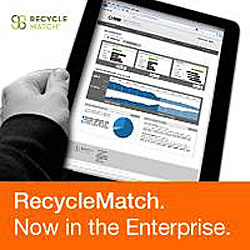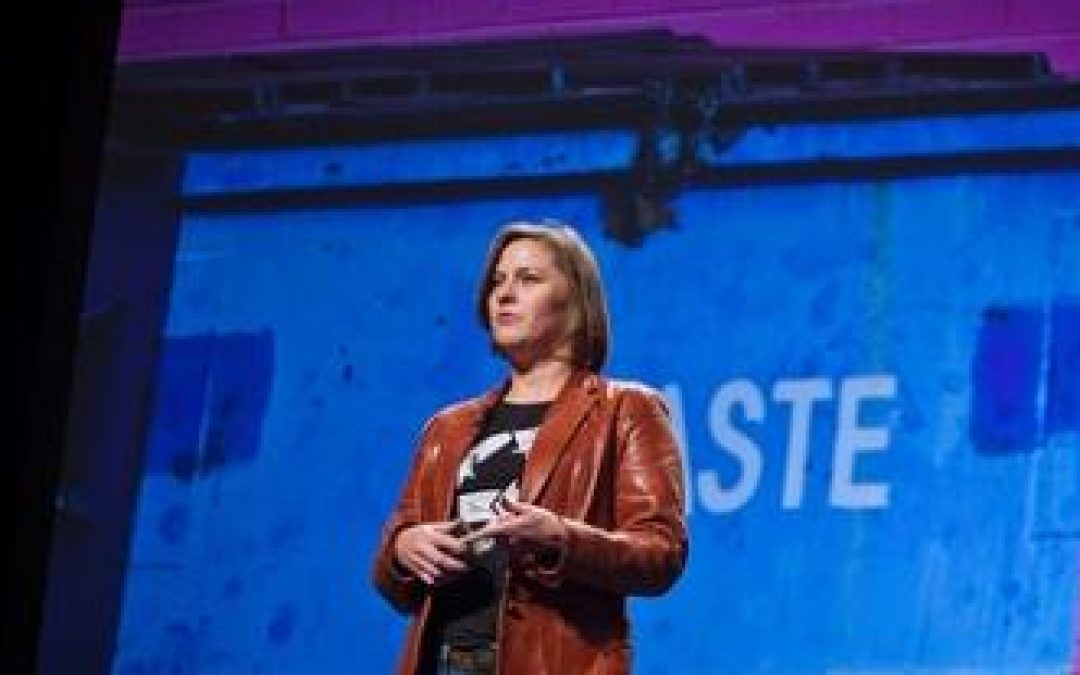Houston, Texas – Though Leadership
“In some ways, I feel like my whole life has prepared me for this opportunity.”
Brooke Ferrel of Recycle Match is considered a leader in zero waste management with a software company that enables other companies to source and sell waste materials. This saves companies big bucks and our landfills a lot of space. Learn more about RecycleMatch’s successes through their informative case studies and the interview with Brooke below.

RecycleMatch enterprise software
What is RecycleMatch?
RecycleMatch is the first enterprise software platform that helps companies and large organizations make more money for their byproducts, accelerate their zero waste efforts, and automate their sustainability reporting as it relates to waste.
How could RecycleMatch be considered Noble Profit?
Whether you are focused on climate change, or the strains of business on natural resources like water, land and energy, waste plays a significant and often overlooked role. The IPCC puts carbon emissions from waste at 3-5% of total emissions. However, by taking a life-cycle approach, the multiplier effect grows dramatically when take into account the reduced use of new natural resources by reusing, repurposing, recycling the ones we already have in our business ecosystem. Helping companies recognize and capture the highest economic and environmental value of the existing resources in their dumpsters means that fewer resources are wasted. Using our resources more effectively has a massive ripple effect – with positive economic and environmental impacts on business, communities and ecosystems.
What is the impact of your work?
Our ultimate goal is to make landfills obsolete by helping companies and enterprise organizations find the highest and best use for all of their ‘waste’ or byproduct materials. RecycleMatch has already diverted millions of pounds of waste from landfills, helped companies save hundreds of thousands of dollars, and helped them get 10-20% more for their recyclables. Now, we have launched the enterprise platform as a way to scale our business and make a larger impact faster.
What is your path to get where you are?
In February 2011, we launched our public online marketplace because our hypothesis was that a transparent marketplace was a key element to accelerating zero waste and maximizing the value of materials. We learned that the competition from an online auction or sealed bid sale could increase the value of materials by 10-20%. We learned that the increased visibility from online listings did in fact accelerate discovery of new solutions for landfill diversion.
But, we also learned that large organizations (the ones with the most waste and the most valuable byproducts) weren’t likely to use this public marketplace. They wanted more control, and more privacy. But they also needed more visibility within their own organizations, and automated reporting features. We took all of this learning, and launched the first enterprise software platform focused on helping companies maximize the economic value of their byproducts and accelerate zero waste efforts. We are in pilot now with two great companies, and talking to many more about coming on board. Now it’s easier for us to see the future state where these companies can all benefit from data transparency without giving up their privacy. They can compete, and they can collaborate all in one place.
What professionally compels you to do this?
Basically, when I see a problem, and I know I can do something to fix it, it’s hard for me to keep walking. I never want to regret not trying something, especially something that would have added value to the world.
In some ways, I feel like my whole life has prepared me for this opportunity. My grandmother grew up in the depression and really understood that everything could still be used. I loved yard sales as a kid. When I figured out someone would pay for a toy I didn’t use much, I’d rush to find other toys they might like. My marketing career really paved the way for RecycleMatch in ways that most people find unexpected.
Most people think of marketing as the root of consumerism, making people want more stuff. But marketing waste streams and commodity recyclables is still marketing, and it’s fun to apply the same principles of selling furniture and burgers to selling PET and OCC (industry names for plastic and cardboard). In 2001, I was working for FKM, an ad agency, and started what would be an eight year stint focused on transforming Waste Management’s brand from trash hauler to environmental services leader with their award winning Think Green campaign. If I had not had that experience, I’m certain I would not have seen the size and scope of the problem. I would have not known that there are innovative solutions looking for waste streams, and that there are waste streams looking for solutions but that they aren’t finding each other fast enough.
What do you hope to achieve personally through this?
Hmm. Noble profit. I want to build a company that is wildly successful so that all of us that have worked so hard on it can make money, and can feel good about the positive and lasting impact we’ve made in the process.
How do you find your clients and advertise? What strategies have been the most successful for you in promoting the business and expanding your client base?
We have extremely low budgets for marketing. Luckily this is a new idea, and as such I’ve been asked to speak at conferences like like PopTech, Fortune Brainstorm Green andSustainable Brands which helps me connect with companies that are interested in learning how they can make more money by managing their resources better.
How do you monetize your products?
Larger companies and organizations using the enterprise platform pay a monthly subscription for the software as a service (SaaS). The companies who buy their materials or provide environmental solutions of course can access the platform for free, and ultimately will be able to access more services and data analytics by paying extra for premium services.
Have you formed partnerships with any other organizations to increase the effectiveness of your strategies?
We are talking now with a couple of potential partners, including management consulting firms who see the opportunity for their clients to make improvements to the way in which they manage and market their byproduct materials.
For me, the cradle to cradle concept really makes it hard to separate design from the end-of-life materials that we impact. One company’s waste is literally the input, or even the design inspiration, for another company.
What mistakes have you made along the way as a green entrepreneur? What advice would you give others starting a green business?
This is hard and you are a pioneer on a new frontier, so be ready. Trust yourself enough to be bold. And, keep in mind that if you aren’t falling down you aren’t learning. So, take the gut-wrenching, embarrassing tumbles with grace and get back up as quickly as you can.
___________________________
Follow us Twitter.com/NobleProfit
Register at Noble Profit to gain valuable insights in related topics.
Noble Profit is brought to you by Creative Entity Org and Creative Entity Productions created by Amy Seidman.


 Noble Profit™ is an authentic source for discovering innovation, trends and investment in clean tech, and sustainable business.
Noble Profit™ is an authentic source for discovering innovation, trends and investment in clean tech, and sustainable business.